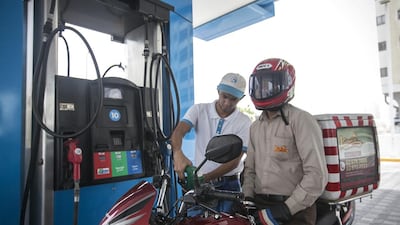The UAE took a major step last year by starting to dismantle energy subsidies, a far-reaching move that used the unprecedented oil price slump as an opportunity to introduce changes that many felt were an essential step toward fully modernising the economy.
Subsidising energy – especially transport fuel – had seemed an intractable policy for many countries, especially the petro-powers of the Arabian Gulf. It was seen as part of the social contract between the citizens and rulers of oil-rich countries in the Arabian Gulf and elsewhere, despite long-standing arguments from a range of respected institutions that it was a wasteful and counterproductive policy.
The International Energy Agency – the OECD countries’ energy watchdog – the IMF and the World Bank had teamed up early last year to press countries to reduce their fuel subsidies on grounds that it made little economic sense in the current environment. The argument had gained force because the oil price slump had put pressure on oil-dependent economies to trim budgets that were rapidly heading towards deficit, with subsidy spending an obvious target.
But there was also a compelling case to be made – especially in a year when the international community was hoping to reach a landmark climate-change deal in Paris – that it was high time for reform by countries that were among the world’s highest per capita emitters of greenhouse gases.
When it made its move on transport fuels in late summer, the force of logic for the UAE’s policy change was quickly recognised by its Arabian Gulf neighbours, which soon began instituting similar policies.
“The timing ... was well chosen,” said Jean-Michel Saliba, an analyst at Bank of America Merrill Lynch, “because the lower oil prices reduce the differential between market and subsidised prices, and make the size of the initial one-off adjustments more manageable”.
In other words, with the oil price slump having dragged down transport fuel prices, the impact on consumers would not be great, at least not in the short term. In fact, UAE prices for January were about 6 per cent lower for petrol compared to a year earlier, and about 12 per cent lower for diesel.
Before it moved to liberalise the transport fuel market, the IEA had ranked the UAE the eighth-most generous country in the world in terms of fuel subsidies, which it estimated to have an economic value of more than 5 per cent of the country’s GDP in 2013.
The flip side of the minimal consumer impact is that the low oil price environment means the budget impact of reducing subsidies will be lower than it otherwise would have been.
The policy change was not just about saving money, however, and the government spelt this out. It was about changing the culture, changing attitudes on the environment and the underlying need to diversify the economy.
“The UAE’s decision to cut energy subsidies was a strong signal for the Emirates’ willingness to implement long overdue fiscal and economic reforms,” said Kevin Koerner, an analyst at Deutsche Bank, noting that “the UAE government justified the move with environmental, generational and economic development reasoning rather than fiscal considerations.”
Saudi Arabia introduced its more modest cuts in fuel subsidies, as well as selective increases in utilities bills, which the UAE also had instituted last year, as part of 20 billion riyals (Dh19.5bn) of cuts in next year’s 840bn-riyal government budget.
Although subsidy reform has been announced for Oman, Kuwait and Bahrain, it remains to be seen how deep it will go.
While the IMF estimated the fuel subsidy burden for the UAE at US$12.6 billion in 2014 – or about 2.9 per cent of GDP – it was greater for some other countries in the region. It was more than 4.5 per cent for Saudi Arabia and Bahrain, for example, although less at between 1.2 and 1.8 per cent for Oman, Qatar and Kuwait.
The fuel subsidy burden was greatest for Iran, which two years ago spent more than 20 per cent of its GDP on it.
The UAE's move also inspired countries further afield. Nigeria, Africa's biggest oil producer and a member of Opec, said it would scrap fuel subsidies this month, allowing petrol to fall initially to 85 naira (Dh1.56) per litre from 87 naira.
Nigeria’s system has been particularly costly and ineffective, as the poor condition of its refinery sector means it has had to import most of its transport fuel, with the government paying overseas refineries for the product it sells at a loss domestically.
Nigeria’s previous government had attempted to end fuel subsidies in 2011, but that led to a week of strikes and protests across the country, which meant they had to be rolled back.
The country’s president, Muhammadu Buhari, who took office last May, had continued the subsidies, which – at more than 1 trillion naira – accounted for almost a quarter of last year’s budget.
Previous attempts at reform by Saudi Arabia and Kuwait had been rolled back. The real test of the policy reforms will be how firmly the governments in question are committed to sticking by them if, and when, oil prices begin to rise again and consumers feel the effect.
amcauley@thenational.ae
Follow The National's Business section on Twitter

